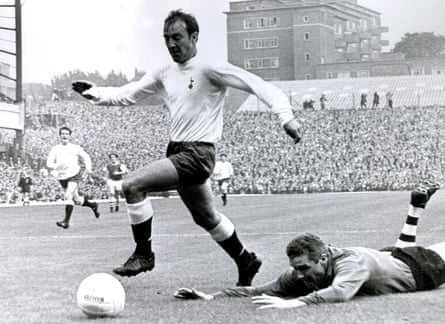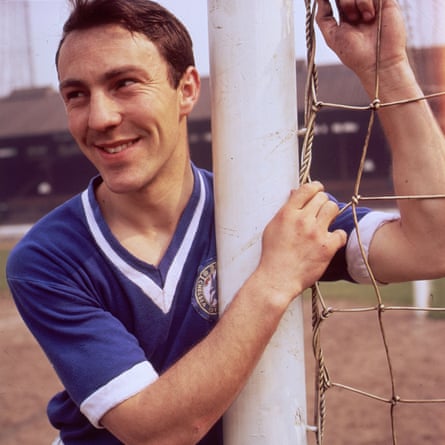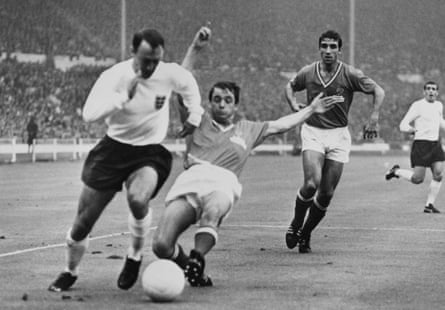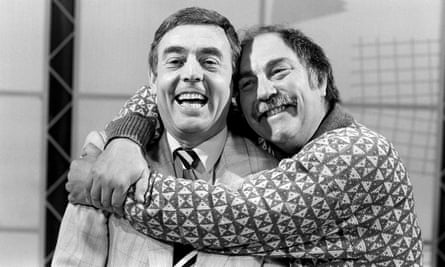Jimmy Greaves, who has died aged 81, scored 44 goals in his 57 games for England and had a prolific goalscoring career in club football for Chelsea, Milan, Tottenham Hotspur and West Ham. He also played in two World Cups, the first in Chile in 1962, when he figured in every game, and the second in 1966, when misfortune with injury famously prevented him from sharing in England’s victory in the final.
A centre-forward of outstanding natural talent, Greaves was one of the greatest attackers of all time. He had fine ball control, acceleration, a notable left foot, and perhaps above all the exceptional flair to find himself time and space inside the penalty box, however crowded it might seem; to make himself almost invisible to opposing defenders until the ball arrived and the moment came to strike.
As defences tightened later in his career, so he modified his game to score many such goals in the box, rather than, as before, using his pace to make devastating, sustained runs, even from the halfway line. In doing so, he became – and remains – comfortably the highest scorer in the history of English top-flight football, with 357 league goals.
Yet for England he never quite reached the heights he wished for. At the World Cup finals in Chile, where so much was expected of him, his usual ebullient opportunism disappeared, and though he did score England’s third goal in a 3-1 win over Argentina, little else was seen of him.

At the finals in 1966 he had indifferent games against Uruguay, Mexico and France, and was injured in the last of these; and for the quarter-final against Argentina he was replaced by West Ham’s Geoff Hurst, who headed the winning goal. Thereafter there could be no real chance of his ousting Hurst, who had another excellent game in the semi-final against Portugal, but some prospect of taking the place of Liverpool’s Roger Hunt. Yet on final day at Wembley his name did not appear in the starting eleven.
The anguish of missing out on English football’s finest moment appeared to haunt him for many years afterwards, and – though he denied it – perhaps contributed to a long battle later in his life with alcoholism. “I danced around the pitch with everyone else but even in this moment of triumph and great happiness, deep down I felt sadness,” Greaves said later.
The son of James Greaves, a London tube train driver, and his wife, Mary, Jimmy was born during the second world war in Manor Park, in what is now the borough of Newham, and brought up in Dagenham, with his sister, Marion, and brother, Paul. He might have been expected, as an east Londoner, to have joined West Ham United. But Chelsea at the time had a famously active scouting system, and it was to Stamford Bridge that he went.
Having already played successfully for England at youth level, he made a spectacular debut for Chelsea, aged 17, in the opening game of the 1957-58 First Division season against Tottenham at White Hart Lane. Playing in baggy white shorts, he time and again raced through the Tottenham defence and scored a goal in Chelsea’s draw, thus initiating a remarkable sequence of scoring on his debut for all his major clubs. He ended that season with 22 league goals from 35 games.
The following season, 1958-59, he would do better still, with 32 goals in 42 games, not missing a match, followed by 29 goals in 40 games and, most phenomenally of all, 41 goals in 40 games in the 1960-61 season. In a memorable match against Wolves at Stamford Bridge, he exploited the slowness of the famous Billy Wright by scoring five times.

The first of his England caps was won in Lima against Peru in 1959, when England were defeated 4-1 and Greaves scored England’s goal. But his international career really took off in the 1960-61 season, when in eight matches he scored 13 goals.
Now Italian clubs moved in on him. There was a protracted battle in London between the agents of Milan and Roma when it became known that Chelsea might be prepared to sell. Eventually, shortly before England set off on their 1961 summer European tour with Greaves, Chelsea accepted an offer from Milan of £80,000.
In short order the London club acknowledged their mistake, trying to buy Greaves back again for £95,000. Milan refused. Greaves was by then reluctant to go to Italy and in mid-air, as he was flying with the England party to Vienna for a match against Austria, gave an impromptu press conference in which he announced that he was staying with Chelsea. Apparently slumbering in his seat like an ancient tortoise, Sir Stanley Rous, the all-powerful secretary of the Football Association, muttered: “I don’t know how he thinks he can.”
Off to Milan he had to go. The disciplined atmosphere of Italian football irked the free-spirited Greaves, and he was still more exasperated when Milan refused him permission to play a match for England, as they were entitled to do at the time.
The wonder of it all was that Greaves scored nine goals in the 10 Serie A games he played for Milan. In December 1961, Milan allowed him to return to London: not to Chelsea, but to Tottenham Hotspur, for £99,999. Once again he scored on his debut – at White Hart Lane – winning a regular place in a team which, the previous season, had become the first of the century to win the FA Cup and Championship double.

In May 1962 he scored the first of Spurs’ three goals when they retained the FA Cup by beating Burnley in the final at Wembley, and his opportunism was as remarkable as ever; in 22 League games he scored 21 goals.
He scored twice in Spurs’ 5-1 European Cup Winners’ Cup final victory over Atlético Madrid in 1963, and won another FA Cup winners’ medal in 1967 after a 2-1 victory over Chelsea.
Feeling at home in north London, he continued on his astonishingly prolific way. The following seven seasons brought him, respectively, 37, 35, 29, 15, 23, 23 and 27 goals. That the 1965-66 season should have brought him only 15 goals was explained by the fact that he contracted jaundice and that even when he came back he was plainly in a weakened condition.
He continued to score in profusion for Spurs until the 1969-70 season, when he managed only eight goals in 28 league games games. In March 1970, having become Spur’s all-time top scorer with 220 league goals, he moved to West Ham in an exchange deal for Martin Peters that valued Greaves at £75,000. Later that year, having been left out of the England World Cup squad that travelled to Mexico, he travelled to that country not as a footballer but as a makeshift rally driver, finishing sixth out of almost 100 starters in the London-to-Mexico World Cup rally.
By now, having lost much of his motivation to play and regretting the move to Upton Park, Greaves had begun to drink heavily. He played only 40 games for West Ham and, after retiring from top-flight football aged 31 in 1971, stayed away from the game almost completely for two years. Although he came back to play non-league football for Brentwood, Chelmsford City, Barnet and Woodford Town, he later conceded that “I was drunk from 1972 to 1977” and that “I lost the 1970s completely.”
After several dark years, however, he slowly emerged from his alcoholism, taking up a column for the Sun newspaper in 1979 and in 1985 finding a new lease of life as a television pundit in tandem with the former Liverpool and Scotland player Ian St John, with whom he was able to display his abundant cockney wit on the popular Saint and Greavsie show.

The 30-minute programme, which was broadcast at midday on Saturdays on ITV, regularly attracted upwards of 5 million viewers with its largely light-hearted look at football, which Greavsie memorably described as “a funny old game”. While Greaves purveyed his knockabout humour, St John for the most part played the giggling straight man, but neither presenter took themselves too seriously. When illness prevented Greaves from fronting two episodes in 1990, he was happy to be replaced by his Spitting Image puppet.
The programme ran for seven years until it was scuppered in mid-flow by Sky’s vacuuming up of the Premier League’s television rights, and afterwards Greaves effectively retired, although he kept up his work as a jovial figure on the after-dinner speaker circuit.
Despite the success of his football and broadcasting careers, Greaves never accumulated great wealth. In 2009 he and other members of the 1966 World Cup squad who had not played in the final belatedly received winners’ medals after a campaign by the Football Association. Greaves sold his medal in 2014 for £44,000, and the following year suffered a stroke. In January this year he was appointed MBE.
In 1958 he married Irene Barden. One of their sons died in infancy. Irene survives him, along with their four other children, Lynn, Mitzi, Danny and Andrew.
Jimmy (James Peter) Greaves, footballer, born 20 February 1940; died 19 September 2021








Comments (…)
Sign in or create your Guardian account to join the discussion